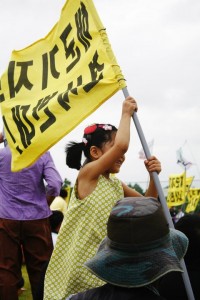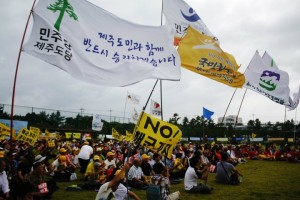 A girl holds a banner that reads “Against the Naval Base no matter what (or even until death)!” Photo: Emily Wang.
A girl holds a banner that reads “Against the Naval Base no matter what (or even until death)!” Photo: Emily Wang.
Today, the 66th anniversary of the U.S. atomic bombing of Hiroshima, there was a large rally against a naval base in Jeju island.
You can follow the developments on the Save Jeju Island website. Also there is a Save Jeju Island page on Facebook.
And please SIGN THE SAVE JEJU PETITION ON AVAAZ, an international petition site: http://www.avaaz.org/en/save_jeju_island/
 Photo: Emily Wang
Photo: Emily Wang
In Organizing Notes, Bruce Gagnon reported:
villagers and supporters now have blocked all the construction entrances to the Navy base construction project.
The villagers have two basic demands:
1) Stop construction
2) Begin from scratch and do an entire new assesment of whether the base is actually needed or not. Included would be a proper environmental impact statement (EIS) which was never done in the first place.
The five opposition political parties in South Korea are now supporting these demands. Several of these political leaders have joined the blockades at the construction entrances and leading Catholic bishops in South Korea are regularly visiting the village and holding mass on the disputed rocky coastline.
Some mainstream newspapers in South Korea now seem to be searching for some “middle ground” which indicates the protests, and growing global support, are having an impact. You can see one such article here
Gloria Steinem wrote a beautiful op ed in the New York Times:
THERE are some actions for which those of us alive today will be judged in centuries to come. The only question will be: What did we know and when did we know it?
I think one judgment-worthy action may be what you and I do about the militarization of Jeju Island, South Korea, in service of the arms race.
[…]
The island itself is said to be the body of the Creation Goddess, and is often called Women’s Island. It is home to the legendary women deep-sea divers known as Haenyeo, as well as sacred goddess groves and shamanistic traditions. For many women especially, it is becoming a symbol of what once was and could be.
Christine Ahn of the Korea Policy Institute also got an op ed in yesterday’s New York Times:
I.H.T. Op-Ed Contributor
Unwanted Missiles for a Korean Island
By CHRISTINE AHN
SEOUL — Gangjeong, a small fishing and farming village on Jeju Island 50 miles south of the Korean peninsula, is a pristine Unesco-designated ecological reserve where elderly Korean women sea divers, haenyo, still forage for seafood. It is also the site of a fierce resistance movement by villagers who oppose the construction of a South Korean naval base on the island that will become part of the U.S. missile defense system to contain China.
South Korea’s president, Lee Myungbak, says the base is needed to protect Seoul from an attack from Pyongyang. The problem with that assertion is that the Aegis destroyers that Lee pledged to deploy at the base aren’t designed to protect South Korea from North Korean Taepodong ballistic missiles (TBM).
In a 1999 report to the U.S. Congress, the Pentagon verified that the Aegis system “could not defend the northern two-thirds of South Korea against the low flying short range TBMs.”
Thus, instead of protecting South Koreans, the militarization of Jeju Island will introduce new security threats to the country by fueling an arms race in an increasingly tense region of unresolved conflicts. The naval base on Jeju Island will equip South Koreans and their American allies with the capability to strike long-range ballistic missile batteries in southeast China that target Japan or Taiwan. Washington sees this base as a central pillar to its defense system in the Asia-Pacific region. China, no doubt, sees it as a new threat.
The result of building the base, therefore, will only be increased stress on the U.S.-China relationship. One South Korean military analyst, Cheong Wook-sik, said that China sees the U.S. Asia-Pacific missile defense system “as the 21st century’s greatest threat.”
And a Chinese Air Force colonel, Dai Xu, speaking more generally about Washington’s Asia-Pacific strategy, wrote recently that Beijing “cannot always put up with American provocations.” He added that China “must draw a clear red line against American attempts to surround it.”
Meanwhile, on the American side, a 2009 Rand Corporation report confirmed that, given China’s growing economic threat to the United States, the Jeju naval base is crucial for America “to project power in the East China Sea and southward.”
Washington hasn’t been forthcoming about this base being built for U.S. interests, particularly in light of growing South Korean resentment of the high costs of U.S. military bases on the peninsula, and tensions over the recent admission by three U.S. veterans of dumping Agent Orange at Camp Carroll in southeast South Korea in 1978.
When I called the Korean Embassy in Washington to register my complaint about the Jeju naval base, the response was: “Don’t call us; call the U.S. State or Defense Departments; they are the ones who are pressuring us to build this base.”
Gangjeong villagers have used every possible democratic means to overturn the decision by Seoul to construct the base there. For four long years, the villagers have squatted on their farmland that was seized by the government, and laid down in front of cement trucks intending to pour concrete over the volcanic rock where pure spring water meets the ocean. Despite the fact that 94 percent of Gangjeong residents voted against the base, the central government, the military and Jeju officials colluded to make Gangjeong the designated site.
This week, the South Korean government ordered the police take further measures to restrict protesters, many of whom have already been arrested, heavily fined and barred from entering the waters and land that they have lived on and depended upon for generations.
Jeju is a bellwether of how conflicts in the Asia Pacific may be resolved in the near future. Will the South Korean people allow its government to blindly follow U.S. plans to draw its country in a standoff against China? Will the South Korean government choose to resolve conflicts through dialogue and cooperation?
No one in the United States, North and South Korea, Japan and China wants another militarized conflict; we still haven’t healed from last century’s wars. This is perhaps more apparent in Korea than anywhere else, a country where a militarized division still separates millions of families.
We must not allow an unneeded military base to destroy Gangjeong’s rich marine ecology and the livelihoods of farmers, fishermen and haenyo — people who provide us with human security — certainly not in the name of “national security.”
Christine Ahn is the executive director of the Korea Policy Institute and a member of the Global Campaign to Save Jeju Island.
Leave a Reply